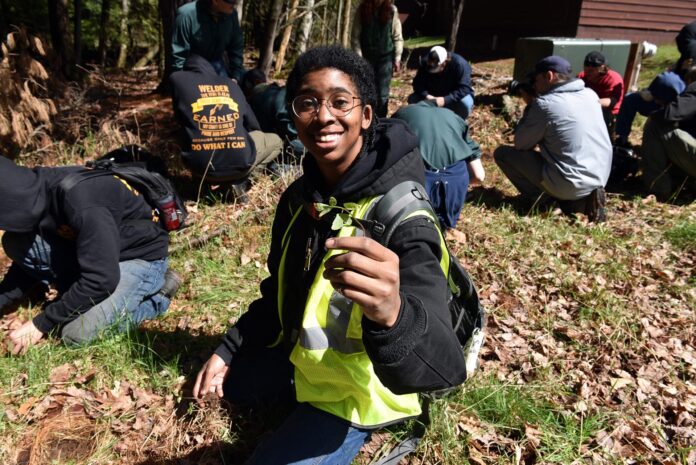The auditorium buzzed with the lively chatter of students eager to embark on a new learning adventure at the Blackwell Job Corps Civilian Conservation Center in Laona, Wisconsin. The noise quickly quieted as Annie Schenkoske, the center’s director, took the podium. “We are going to be learning about timber, fish and wildlife, understory, range, and vegetation,” she announced, emphasizing her excitement to learn alongside them.
Schenkoske is leading the pilot of the Civilian Conservation Centers’ (CCC) new conservation education program, which aims to enhance students’ environmental literacy. The initiative, currently in three Forest Service Job Corps centers, integrates outdoor education with conservation efforts through partnerships with national forests and the Society of American Foresters. These collaborations give students practical exposure to conservation and natural resource management, offering an immersive, hands-on approach to learning about the Forest Service’s mission.
Conservation Education and Career Exploration
The Forest Service Job Corps centers, unique for their focus on conservation-based trades, offer a special opportunity for youth to gain experience working in nature. The centers are also among the inaugural members of the American Climate Corps, positioning them as key players in developing the next generation of environmental stewards. This program provides students with knowledge not only about conservation but also about potential careers within public land management agencies.
Nancy Chapman, the coordinator for the Job Corps National Office, emphasized that conservation education is a vital part of breaking down barriers to accessing public lands and inspiring underserved youth to consider careers in conservation. Through partnerships with the Society of American Foresters and national forests, students receive consistent, professional training to prepare them for future opportunities in the Forest Service and beyond.
Learning by Doing: A Two-Day Curriculum
The program consists of a two-day outdoor curriculum. On the first day, students engage in fieldwork, learning about various conservation topics such as forestry, wildlife, and hydrology through interactive stations. The second day sees students participating in service projects, including trail maintenance and invasive species removal, providing them with direct experience in managing and restoring public lands.
Nicole Shutt, district ecologist for the Chequamegon-Nicolet National Forest, observed how students’ exposure to different career paths within conservation expanded their awareness. Career cards at each station introduced them to potential occupations, helping connect classroom lessons to real-world applications in land management.
Building Environmental Literacy and Interest in Conservation Careers
For many students, the program represents their first meaningful interaction with nature, offering a transformative experience. Meryl Harrell, USDA Deputy Undersecretary for Natural Resources and Environment, shared her excitement about the spark of discovery she witnessed in students as they worked on restoration projects. Students’ engagement with nature fostered a deeper connection to conservation and inspired several to consider careers in the field.
Matthew Powell, a masonry and fire student at Blackwell CCC, appreciated the hands-on approach, particularly the chance to explore different plant species in the forest. Similarly, Gavin Dalle Ave, a carpentry trade student, found the interactive learning far more engaging than traditional classroom settings. Both students encouraged others to seize the opportunity to learn from nature.
Continuing a Legacy of Conservation Education
The Forest Service has a long-standing commitment to conservation education, and this new program is designed to carry that responsibility into the next generation. For students like Sir Falls, a maintenance trade student at Weber Basin CCC, participating in these conservation activities has solidified a desire to pursue a career in forestry.
Since 1905, the Forest Service has prioritized educating young people about the importance of managing and conserving natural resources. The Civilian Conservation Centers aim to provide students with the knowledge and tools to make informed decisions about their futures—whether in conservation or any field that benefits from an understanding of nature’s value.
“I plan to finish my maintenance trade, graduate from Job Corps, and then put all my energy into forestry,” said Falls. “I think I want to have a career in the Forest Service.”











